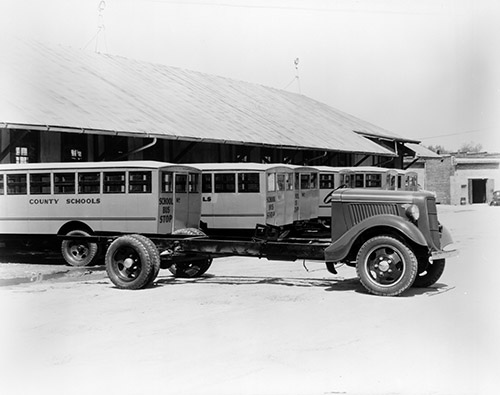Public Education
See also: Community Colleges; Literary Fund; Pearsall Plan; Department of Public Instruction; Pupil Assignment Act; School Consolidation; Swann v. Charlotte-Mecklenburg Board of Education; Textbook Commission; University of North Carolina System; Private Higher Education
 Part i: Introduction; Part ii: The Literary Fund, the Education Act, and the Growth of Common Schools; Part iii: The First Graded Schools, the State Constitution of 1868, and Legal Segregation; Part iv: Expansion, Consolidation, and the School Machinery Act; Part v: Desegregation and Equality in Public Education; Part vi: Reform, Innovation, and the Modernization of Public Schools
Part i: Introduction; Part ii: The Literary Fund, the Education Act, and the Growth of Common Schools; Part iii: The First Graded Schools, the State Constitution of 1868, and Legal Segregation; Part iv: Expansion, Consolidation, and the School Machinery Act; Part v: Desegregation and Equality in Public Education; Part vi: Reform, Innovation, and the Modernization of Public Schools
Part I: Introduction
The history of public education in North Carolina reflects the state's development from its primarily rural, agrarian beginnings to its position in the early 2000s as a national leader in agriculture, technology, and industry. Turning points in the growth of the public school system include the establishment of common schools in the early nineteenth century and of the first graded schools in the Civil War and Reconstruction eras, actions taken in the early twentieth century to improve schools through the use of public funds and to fully extend public education to African American children, integration of schools during the civil rights movement of the 1950s and 1960s, and introduction of numerous educational reforms and programs that formed the basis of the modern North Carolina public school system. In the realm of higher education, North Carolina's 16-campus University of North Carolina System and 58-campus community college system represent some of the finest such institutions in the nation, serving a huge number of the state's children and adults.
Keep reading > Part II: The Literary Fund, the Education Act, and the Growth of Common Schools ![]()
References:
Roberta Sue Alexander, "Hostility and Hope: Black Education in North Carolina during Presidential Reconstruction, 1865-1867," NCHR 53 (April 1976).
Hugh Victor Brown, A History of the Education of Negroes in North Carolina (1961).
Lindley S. Butler and Alan D. Watson, eds., The North Carolina Experience: An Interpretive and Documentary History (1984).
William H. Chafe, Civilities and Civil Rights: Greensboro, North Carolina, and the Black Struggle for Freedom (1980).
Davison M. Douglas, Reading and Writing Race: The Desegregation of the Charlotte Schools (1995).
Linda Flowers, Throwed Away: Failures of Progress in North Carolina (1990).
Hugh T. Lefler, North Carolina History Told by Contemporaries (1956).
James L. Leloudis, Schooling the New South: Pedagogy, Self, and Society in North Carolina, 1880-1920 (1996).
Marcus C. S. Noble, A History of the Public Schools of North Carolina (1930).
Image Credit:
School Bus, 1936. From the Barden Collection, North Carolina State Archives, call #: N.53.15.6645, Raleigh, NC. Available from https://www.flickr.com/photos/north-carolina-state-archives/3615061838/ (accessed September 14, 2012).
1 January 2006 | Colomb, Nayda Swonger; Johnson, K. Todd; Justesen, Benjamin R.; Latta, E. Michael; Matthews, Scott; Mazzocchi, Jay